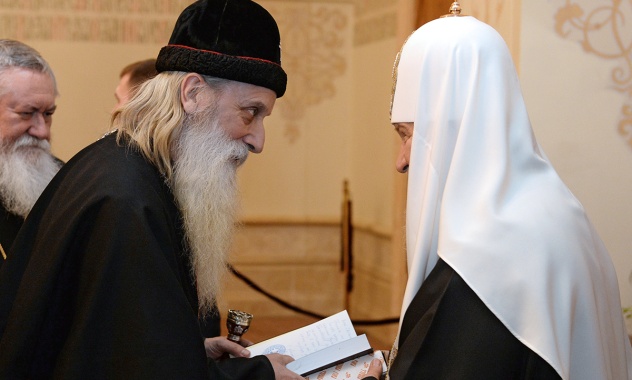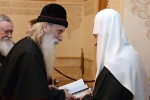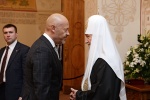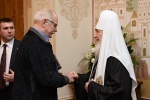Reception on the occasion of 6th anniversary of enthronement of His Holiness Patriarch Kirill of Moscow and All Russia takes place at Cathedral of Christ the Saviour
On 30 January 2015, the eve of the 6th anniversary of the enthronement of His Holiness Patriarch Kirill of Moscow and All Russia, a reception took place at the Cathedral of Christ the Saviour.
His Holiness Patriarch Kirill received greetings from high officials, figures of culture, science and art, benefactors, sportsmen, journalists, representatives of the Russian Orthodox Old-Rite Church, Roman Catholic Church, other Christian confessions and Muslim and Jewish communities.
Among those who attended the reception at the Cathedral of Christ the Saviour were permanent members of the Holy Synod of the Russian Orthodox Church, representatives of the Local Orthodox Churches, members of the Supreme Church Council, hierarchs of the Russian Orthodox Church, and heads and staff members of the synodal institutions.
Metropolitan Yuvenaly of Krutitsy and Kolomna greeted His Holiness Patriarch Kirill on behalf of the Holy Synod, noting that selfless and active service of Patriarch Kirill sets an example for all archpastors of the Russian Orthodox Church and wishing the Primate “God’s abundant help in his primatial ministry for many years.”
Mr. Sergei Lavrov, Minister of Foreign Affairs of the Russian Federation, greeted His Holiness Patriarch Kirill, saying in particular, “Your Holiness… you began to influence the situation in Russia and our external policy not six years ago, but much earlier, in your previous capacity. I remember very well how you formulated a new concept concerning the necessity to strengthen moral principles in international relations… Thank you very much for what you are doing for the Russian world, for our country and for strengthening our international positions.”
His Holiness Patriarch Kirill expressed his gratitude to all those present, saying:
“The Church is conservative by nature. She is called to preserve certain traditions, which makes an impact on those who serve the Church. Needless haste is not characteristic of the Russian clergy. Yet, today the external situation bears such a strong influence that the Church is forced to change her line of thought and, what is most important, her attitude to the reality outside her. It does not mean that the Church takes a reformist stand; it means that she gives serious consideration to the current situation on a level of church-wide discourse and elaborates her position on today’s most topical problems.”
































